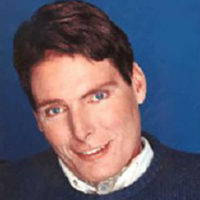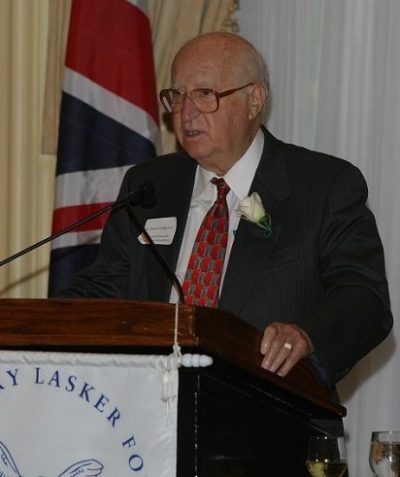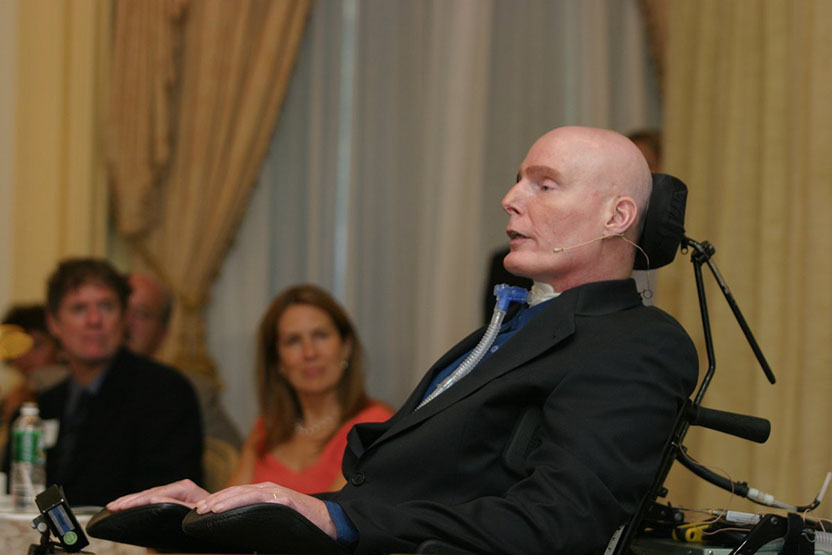
Christopher Reeve
The Christopher Reeve Paralysis Foundation
For perceptive, sustained, and heroic advocacy for medical research in general and victims of disability in particular.
This year’s Lasker Public Service Award honors an actor who has transformed personal tragedy into public service. With bravery and perseverance, Christopher Reeve has worked tirelessly to bolster support for medical research in general and victims of disability in particular. His knowledge of the science and personal heroism have allowed him to wield tremendous influence as an advocate. Instead of bowing to a sudden, life-altering injury, he mustered his internal resources and exploited his connections to advance research that targets spinal cord repair. Through his dogged quest for funding from both the private and public sectors, he has improved the prospects that scientists will devise innovative treatments not only for this condition, but for a wide range of illnesses such as Parkinson’s disease, Alzheimer’s disease, multiple sclerosis, amyotrophic lateral sclerosis (Lou Gehrig’s disease), and the consequences of stroke. Reeve has informed himself about the scientific as well as political aspects of his mission; this approach, along with his role as a public figure, have earned him unique status with researchers, lawmakers, and private citizens alike. Although he must endure the physical and emotional hardships of living in a body that is largely immobile, he is far from paralyzed.
In 1995, an equestrian accident paralyzed Reeve from the shoulders down. Unable to breathe without the help of a machine, Reeve confronted a new life. While grappling with his own situation and the grueling demands of an uncertain recovery process, he began to reach beyond his own self-interest. Even before he went home from the rehabilitation facility where he spent many months after the accident, he started plotting how he might make a difference for people with spinal cord injuries. He educated himself about the promise of various research strategies and mastered this material at a sophisticated level. His newfound knowledge nurtured the conviction that overcoming his seemingly hopeless medical situation is within reach, which has fueled his resolve to do everything within his power to convert that vision into a reality.
Award presentation by Daniel Koshland, Jr.
 The Lasker Foundation sponsors four types of awards: the Basic Medical Research Award, designed to reward those at the frontier, trying to wrest the secrets of disease away from a reluctant Nature; the next is the Clinical Medical Research Award, given to someone who has translated those secrets into a novel clinical advance; third is the Special Achievement Award, a lifetime achievement award for medical scientists.
The Lasker Foundation sponsors four types of awards: the Basic Medical Research Award, designed to reward those at the frontier, trying to wrest the secrets of disease away from a reluctant Nature; the next is the Clinical Medical Research Award, given to someone who has translated those secrets into a novel clinical advance; third is the Special Achievement Award, a lifetime achievement award for medical scientists.
The Lasker Public Service Award is for individuals who are supporting the infrastructure of science and medicine to make possible the great advances in medical care that we have seen in the last century. Joe Goldstein has just indicated to you the winners in 2003 of the first two types of awards.
It is my pleasure to announce to you that this year’s winner of the Public Service Award is Christopher Reeve — actor, activist, great advocate of research in medicine for the betterment of mankind. As you all know, Christopher Reeve was an actor with a promising career ahead of him, when in 1995 he had a horseback accident that paralyzed him from the shoulders down. What many of you don’t know — as I didn’t before my work on the Lasker Selection Committee — is that before his accident, Christopher Reeve was an activist in various causes such as Amnesty International, the Save the Children Campaign, and the National Resources Defense Council.
Acceptance remarks

Thank you so much to the Lasker Foundation Jury. I must say it’s extremely overwhelming to be in the same room with so many brilliant minds. It is a tremendous honor to receive this award. But being recognized for public service on behalf of medical research only reinforces my belief that we must remove the obstacles that prevent medical research from truly serving the public. One hundred and twenty-eight million Americans suffer from presently incurable diseases. Fifty-four million Americans live with disabilities. That is an enormous and unacceptable percentage of the population.
We have many great scientists who want to serve the public, who want to see people get better. And yet we let political and religious influences interfere with public policy that would allow them to move forward. Why do we do this? In congressional hearings, patients, physicians, legal experts, researchers, theologians, and others have their say. But when the time comes to make decisions about public policy, there is an undue influence from politics and religion that is detrimental to patients. Other countries around the world have considered the same ethics of scientific research and reached conclusions that put patients first.
